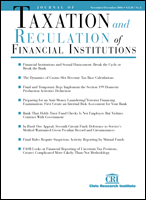Complete Issue
Author: Houman B. Shadab.
Source: Volume 28, Number 01, September/October 2014 , pp.1-60(60)

< previous article |return to table of contents
Abstract:
In our first article, Alison Manzer provides an investigation of the regulatory issues facing banks that participate in the syndicated loan market. Chief among these are anti-money laundering rules, credit assessment, and unsound lending practices. Ms. Manzer also provides sample language from agreements that help to ensure compliance. Our second article brings us up to date on the transformational piece of tax legislation known as the Foreign Account Tax Compliance Act (FATCA). Michael Orchowski and Andrew Solomon explain where FATCA implementation currently stands, including the May 2014 Notice 2014-33, which expanded the definition of “preexisting obligation.” How to improve the internal structure and governance of hedge funds to the benefit of both managers and investors is subject of our third article, written by myself. After first covering the basic legal and governance regime applicable to hedge funds, I discuss the common costs and inefficiencies borne by investors, such as subtle misreporting by managers and misaligned fee structures. I then discuss areas for improvement, which may include paying managers higher performance fees and making it more difficult for investors to access their funds. This issue’s fourth piece is a “State & Local” column by Gregory A. Bergmann, Keith Gray, and Karen Boucher. The authors discuss the impact on investment funds from state laws that seek to expand tax revenues by making it easier to find a taxable presence in the state, and taxing receipts on market-based sourcing instead of cost of performance. Next, in the “Mergers of Financial Institutions” column, Kevin F. Powers and Howard M. Wagner discuss the final regulations under Internal Revenue Code Section 336(e). The authors note that in the context of selling an S corporation, a Section 336(e) election permits greater flexibility and tax advantages in treating the sale of the target’s stock as a sale of its underlying assets. Journal staff round out the issue with an overview of the state of trade finance in a “US/International” column. The column reviews the primary tools of and alternatives to traditional trade finance methods, including the bank payment obligation, and related issues such as the applicability of capital regulation.Keywords: debt syndication; Foreign Account Tax Compliance Act; hedge fund governance; state taxation of financial institutions
Affiliations:
1: New York Law School.